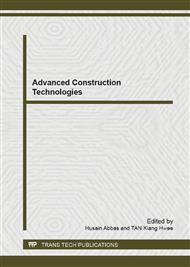p.1721
p.1725
p.1730
p.1735
p.1739
p.1744
p.1751
p.1755
p.1760
The Energy-Saving Management System Design of Major Projects in Implementation
Abstract:
The energy-saving management system of major projects in implementation has always been in a state of imperfect. On the basis of combining energy-saving management status of major projects in implementation, referring to the research results of the management mechanism design theory at home and abroad, this paper aims at the primary interest-related subjects of the major projects energy-saving, uses economic mechanism designing theory and incentive theory, designs the energy-saving management mechanism; It does the theoretical analysis of the government and major projects owner with the complete information dynamic game model, then, provides decision evidence for the government to formulate the rational management intensity and maximize the interests of all parties. At last, the paper provides the suggestions to solve the existing problems of major projects energy-saving management.
Info:
Periodical:
Pages:
1739-1743
Citation:
Online since:
April 2014
Authors:
Keywords:
Price:
Сopyright:
© 2014 Trans Tech Publications Ltd. All Rights Reserved
Share:
Citation:


